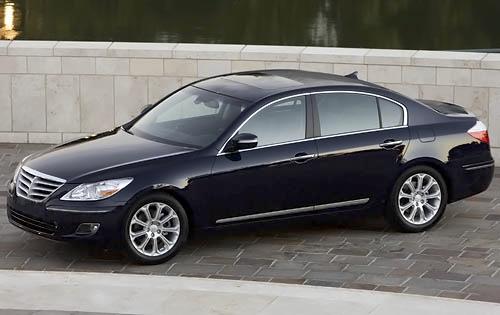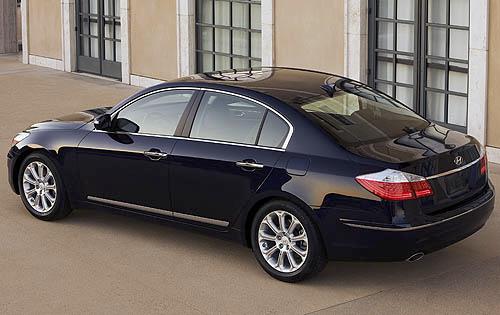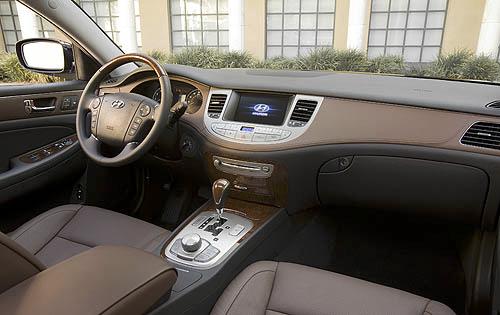While historically high new and used car prices have forced buyers to look for "older" vehicles that may have aged well as a way of saving money, the issues of reliability and dependability have become even more crucial.

And for those considering buying one today, the 2010 Hyundai Genesis has received generally positive reliability ratings and has often been noted for having fewer mechanical issues compared to some of its competitors.
History has proven that with proper care, routine maintenance, and timely repairs, the 2010 Genesis can surpass 200,000 miles and still be in decent condition. Some can even go well beyond that mileage mark.
Still, all cars likely have some reported mechanical issues, including some that may be more specific to a particular model, even those with strong reliability reputations. That's just a natural part of car ownership.
So here, ...
- We'll list the mechanical problems that at least some owners have experienced that should be checked before buying one today.
- Next, we'll take a look at the overall pros and cons of buying a 2010 Genesis all these years later.
- Then we'll review its features as it was originally released in 2010.
- And finally, we'll suggest ways of buying one today at the lowest price.
2010 Hyundai Genesis Mechanical Problem Watchlist:
The 2010 Genesis generally has a good reliability record, but as with any car model, there were occasional reported issues. Here are some mechanical problems or concerns that were reported by some owners that should be included in an inspection before buying:
Suspension Components: Some owners reported issues with suspension components, such as bushings or control arms, which could lead to noises, vibrations, or uneven tire wear.
Transmission Issues: There were occasional reports of transmission problems, including rough shifting or hesitation, particularly in earlier models.
Electrical Problems: A few owners experienced issues with various electrical components, such as malfunctioning infotainment systems, power windows, or door locks.
Brake Wear: Some owners noted premature wear on brake pads and rotors. This issue could be influenced by driving habits as well as the quality of brake components used.
Engine-related Problems: While not widespread, some reported issues included oil leaks or minor engine component failures. Routine maintenance and regular oil changes can help prevent such problems.
2010 Hyundai Genesis Pros
Cost Savings: Buying an older 2010 Genesis can obviously save a significant amount of money upfront. However, this savings has to be weighed against the increased risk for possibly higher maintenance and repair costs going forward.
Value for Money: Despite being an older model, the 2010 Genesis still offers many features and luxuries found in newer cars at a fraction of the cost.
Reliability Potential: The 2010 Genesis has a generally positive reliability record, and if well-maintained, it can offer decent reliability, potentially saving money on repairs and maintenance compared to many other vehicles.
Depreciation: Since the majority of the depreciation has likely already occurred, the rate of depreciation might be slower compared to purchasing a newer vehicle.
Powerful Engine Options: There's a choice of strong engines, including a V6 and a V8, providing ample power and performance.
Spacious Interior: The car has a roomy interior, offering comfort for passengers.
Smooth Ride: Its suspension was tuned for comfort, providing a smooth and quiet ride on most road surfaces.
2010 Hyundai Genesis Cons
Outdated Technology: The technology in the 2010 model might be outdated compared to newer cars. This would include less advanced infotainment systems and connectivity options.
Potential Maintenance Costs: As the car ages, there might be a higher likelihood of repair and maintenance costs, especially if it hasn't been well-maintained by previous owners.
Fuel Economy: Especially with the V8 engine, the Genesis wasn’t the most fuel-efficient car in its segment, which could be a concern for some buyers. Also, older cars might not be as fuel-efficient as newer models due to advancements in engine technology and efficiency over time.
Safety Features: While the 2010 Genesis likely has basic safety features, newer cars often come with advanced safety technology that might not be present in the older model.
Handling: While it offered a comfortable ride, this Genesis wasn't as sporty or agile in handling compared to some rivals in its class.
Resale Value: Historically, Hyundais haven’t retained their value as well as some other brands, so the long-term resale value may not be strong for those who resell the car down the road.
2010 Hyundai Genesis Review
There's lots to like about the 2010 Hyundai Genesis, including its powerful engines, smooth ride, spacious cabin, top crash safety scores, long list of standard features and options, and strong value for the money.

Since its debut with the 2009 model year, not only did the Genesis receive a myriad of accolades, but it made a serious new challenge to the upscale European and Japanese automakers who traditionally dominate the luxury car segment.
And a major selling point was that it offered the style, quality, features and performance of many of its competitors at thousands less.
True, it didn't have the name and brand prestige yet of its famous rivals, but for those seeking a premium automobile at a discount price, the Genesis can make a lot of sense.
Trims, Standard Features And Options:
The rear-wheel-drive 2010 Genesis is available in two trims, named to indicate their engine sizes: 3.8 and 4.6.
Standard features on the Genesis 3.8 include leather upholstery, an 8-way power driver seat, a 4-way power front passenger seat, heated front seats, full power accessories, dual-zone automatic climate control, keyless ignition, keyless entry, a leather-wrapped steering wheel, steering wheel audio and cruise controls, 17 inch alloy wheels, foglights, Bluetooth and a 7-speaker stereo system with a CD player, satellite radio, iPod integration and an auxiliary audio jack.
There's also a Premium package found on some Genesis 3.8 models that adds premium leather seating surfaces and interior trim, driver memory functions, a sunroof, a power tilt/telescoping steering wheel, automatic windshield wipers, a rear power sunshade and a Lexicon 14-speaker surround-sound system with a 6-disc CD changer and HD Radio.
Some 3.8 models can also be found with the Premium Navigation package (must already have the Premium package) that includes a hard-drive-based navigation system (with real-time traffic and a rearview camera) and 18 inch wheels.
Standard features on the Genesis 4.6 include all of those on the 3.8 as well as both the Premium and Premium Navigation packages.
Also found on some of both models is the Technology package which includes a ventilated driver seat, adaptive xenon headlights, an electronic parking brake with automatic vehicle hold, front and rear parking sensors, adaptive cruise control, an upgraded 17-speaker Lexicon stereo system, Bluetooth and a 6-disc DVD changer and navigation system. This package also features Hyundai's Driver Information System, similar to BMW's iDrive and Mercedes' COMAND, which conveniently integrates many of its system controls into one on-screen interface.
Engines, Powertrain And Gas Mileage:
Powering the Hyundai Genesis 3.8 is, not surprisingly, a 3.8 liter V6 engine that pumps out 290 horsepower and 264 pound-feet of torque. Under the hood of the Genesis 4.6 is a 4.6 liter V8 that's good for 375 horsepower and 333 lb-ft of torque. Both are coupled with a six-speed automatic transmission with manual shift control.
In performance testing, the Genesis 4.6 went from a standstill to 60 mph in just 5.9 seconds. And the 3.8 made the same sprint in just 6.3 seconds. These are fairly remarkable times for a sedan of these large proportions and price range.
The EPA-estimated gas mileage for the Genesis 3.8 is 18 mpg city and 27 mpg on the highway. The fuel economy for the 4.6 is impressively only slightly lower at 17 mpg city and 25 mpg highway.
Safety:
Standard safety features for both models include antilock disc brakes (ABS), traction control, stability control, front and rear-seat side airbags, active front head restraints and full-length head curtain airbags.
The 2010 Genesis also excelled in government crash tests, earning perfect five-out-of-five-star ratings in every frontal and side-impact protection category.
Interior:

The interior of this Genesis is elegant and refined while solidly constucted of top-notch materials. Its sweeping dashboard arcs and brilliant electroluminescent gauges make for an appealing and high tech ambiance. Even with the abundance of features and buttons, the layout has been logically designed and is user-friendly.
With generous amounts of padding, both the front and rear seats are very comfortable and supportive, even on long trips. The rear passenger area is particularly spacious with plenty of room for even taller adults. And most will be satisfied with the 15.9-cubic-feet of trunk space.
Drive:
The 2010 Genesis' soft and compliant ride is just as one would expect from a luxury vehicle, handling most road bumps and imperfections with ease. While specifically engineered to optimize a smooth, quiet and refined driving experience, the Genesis is still capable of some dynamic maneuvers when needed. The available power is right up there with its better known rivals and linear acceleration is impressive with either the V6 or V8.
 By Josh Rosenberg
By Josh Rosenberg